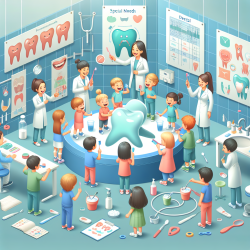As a practitioner focused on improving outcomes for children with special needs, it's essential to stay informed about the latest research. The study titled Oral health evaluation in special needs individuals offers critical insights into the oral health challenges faced by children with conditions such as Down syndrome, cerebral palsy, and intellectual deficits. Understanding these findings can help you tailor your approach to better meet the needs of these children.
Key Findings
The study involved 47 students aged 12-25 years, with a focus on evaluating dental caries, oral hygiene, and malocclusion. The main findings were:
- High prevalence of dental caries: 44.7% of the children had a decayed-missing-filled teeth (DMFT) index greater than 10.
- Inadequate oral hygiene: 53.2% of the children had an Oral Hygiene Index (OHI-S) between 0 and 1.16, indicating poor oral hygiene.
- Significant malocclusion: 48.9% of the children were classified as Angle class I, and 25.5% had no malocclusion.
- Daily brushing habits: 63.8% reported brushing their teeth three times a day, and 85.1% did it by themselves.
Implications for Practitioners
These findings highlight several areas where practitioners can make a significant impact:
- Targeted Oral Hygiene Programs: Given the high prevalence of dental caries and inadequate oral hygiene, implementing structured oral hygiene programs can be beneficial. These programs should focus on educating both children and their caregivers about proper brushing techniques and the importance of regular dental check-ups.
- Specialized Training: Practitioners should seek additional training to handle the unique needs of children with special needs. This includes understanding the specific oral health challenges associated with conditions like Down syndrome and cerebral palsy.
- Multidisciplinary Approach: Collaborating with other healthcare professionals, such as physical therapists, psychologists, and occupational therapists, can provide a holistic approach to the child's well-being.
Encouraging Further Research
While this study provides valuable insights, there is still much to learn about the oral health of children with special needs. Practitioners are encouraged to engage in further research to develop more effective strategies for improving oral health outcomes in this population.
To read the original research paper, please follow this link: Oral health evaluation in special needs individuals.










